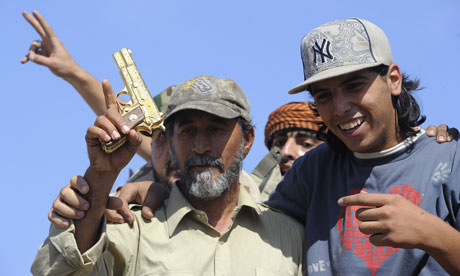On October 22, I wrote an article, titled "Gaddafi's Death Fuels Arab Uprising", where, somehow, I explained that the incident paved way for military withdrawal from Libya and provided a better chance to look after countries severely crack down unarmed civilians, calling for democracy and a dignified living condition. In this article I want to shed light on fearsome issue that allowed Muammar Qaddafi to act at will and whim, without considering international community----alternative to autocracy would be theocracy. There are still doubts and fear of what former regimes and authoritarian leaders constantly were telling to foreigners for justifying their illegitimate governments.
Muammar Gaddafi ruled the country for 42-years! Zine El Abidin Ben Ali, Hosni Mubarak, former presidents of Tunisia and Egypt respectively also ruled their countries for decades. Ali Abdullah Saleh of Yemen and Basharul Asad of Syria and many other leaders of Arabian countries have similar case.
So, why the international community has acted so late, and why those countries who lead the so-called democratization process have ever pressurized authoritarian regimes to loosen up gripe over the country and allow people breathe in broader political circumstance? Instead they had quiet warm relation. See, for instance, Egypt of Hosni Mubarak which annually was receiving large financial support directly from federal treasury of US. Why international community kept silence for that long?
Here is the answer. But let's explain issue in detail.
After growing reactionary move started against western civilization and western values in Muslim world, different movements with different objectives and priorities emerged to provide an alternative to the so-called western cultural assault. Though the reactionary moves led to formation of variety of organizations, having different approaches on the issue of how to deal with western civilization and its growing cultural effects, but the notion of revitalization of Islamic glorified past found a dominant position and reverberated with remarkable supporters across Muslim countries.
The founders maintained that dignity would resurge if true interpretation of Sharia was made. By the course of time, the concept perverted into a more radical interpretation of Islamic Jurisprudence that finally led to armed violent movements. Large extremists groups were formed, involving in armed violent activity to oust governments and establish the so-called Islamic government.
However, the efforts of such groups did not succeed as ruling regimes with the support of foreign countries suppressed them, but they were not completely erased, as now we can find them in the face of Islamic radicals spread all over the Muslim countries, taken from Ashabab, of Somalia to Al-Qaeda, to Taliban and etc.
The prospective of the groups were severely threatening to regional and global peace and security. politicians as well as political and economic experts have been in view that establishment of Islamic government based on the interpretation of Sharia like that of Al-Qaeda and Taliban would always alarm peace and security of regional and global countries.
What they could do was to support regional governments to challenge the process and prevent the growth of extremism and fundamentalism. In another word, they had not choices ahead. There was a choice: the bad and the worst. Supporting dictatorship was a bad thing, but weakening them, that ultimately paved way for extremists, was the worst.
So, they chose the bad one and maintained good relation with these countries.
But no doubt, there were also large economic and political interests that enticed not to irritate regional allies. Say, for example, many oil reach countries. Though regimes are illegal and illegitimate, but still no officials dare to criticize and pressurize to a level that force officials to change their mind and reassess foreign policies. What I am trying to tell is that all policies and measures are not entirely fixated on a set of humanitarian values.
What I am telling is that values are also closely linked with political and economic interests. Indeed, combined factors and various considerations restored a convenient relationship among western and Arab countries.
The relation was moving on bilateral interest, in another word, on a kind of contract. Western countries: "do not let extremists grow". Arab: "ok, but shut your mouth and do not ever lash out on the way we rule people".
It became decades, though there were fluctuations from both sides, but the principles of the contract remained intact and no sides found the will to violate what they agreed on. Arthurian regimes justified their rule on the basis of greater threat to global peace and security----Islamic radicals. And meanwhile, western countries, particularly US, were kept mouth shut on ground realities.
But as the, so-called, uprising sprang all over Arab world distorted the classic conception. Decision makers came into an understanding that an alternative to autocratic regime was not necessarily Taliban regime or theocratic regime. There were people who insatiably demand for democracy and human rights. With growing unrest, countries cautiously started shaking heads to let fall the rotten concept and approve people demands: no more living under the rule of dictators, sitting in palace and did nor care about people's sufferings.
However, the prospective looks not bad, but there are issues I found irritating.
Just put consider statements of National Transitional Council Chief of Libya, Mr. Abdul Jalil, who during a speech---declaring libya freed of 42-years-long rule of Muammar Qaddafi's regime----promised to restore Islamic Shariah used not to be enforced in the past. He clearly called that the new constitution would not oppose Islamic laws and it would be based on Shariah.
He particularly pointed that polygamy was concealed by former regime and monogamy was enforced which, according to him, was against Islamic Shariah. So, the new government would restore it and allow Libyan men to marry four women legally.
Thus, his historic speech shows how Islamists have dominance within the National Transitional Council. But the question where Libya may go is too early to answer.

